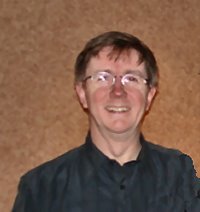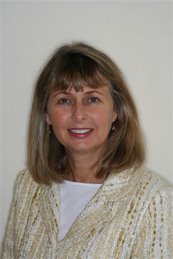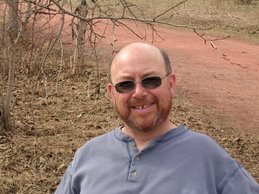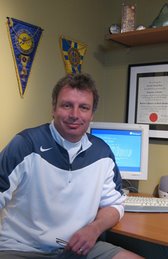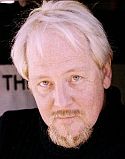Dr. John Clark is not only a member of our Advisory Panel, he is medical director for the Calgary Health Region Chronic Pain Centre, and an international expert on chronic pain. He was kind enough to take some time out of his busy schedule to give us a "web interview". Hope you find it as interesting as I did.
You started out as an anesthetist. Can you tell us what led you into the field of pain medicine from there?
Exposed as a resident in anesthesiology to chronic pain, had previously worked as family doctor and it was what was available as a job when I wanted to return to Halifax.
How has the practice of treating pain changed from when you first started out to the present day?
Originally very focused on physician only care, no resources available to provide care, pain was just ignored. This is still an issue to some degree but it is now recognised that working as a team with a person with chronic pain and their family is a much better way to help - interdisiplinary teams.
Resources and wait-times are still a major issue.
Can you define chronic pain, for anyone who might not really understand the term?
Any pain that lasts longer than it should based on why pain initially occurred
What frustrates you most about the field of pain medicine or treating pain?
The lack of education provided to all health care professional about pain during their eduaction. Less than 1% of education is directed to pain management but pain is the most common reason we see a physician!
Do you have any words of advice for people out there who are suffering chronic pain?
Become advocates, join consumer groups like the Chronic Pain Association of Canada to advocate for more resources and better care and better education
How did you get involved in the Pain Diaries Advisory Committee?
This is a unique way to bring the issue of pain and how to help those with pain to a much broader audience, to raise awareness and to advocate for better care and more timely access to care. Empowerment.
What sort of impact do you feel a play like this could have? Can art and science help each other out, or will they always just be opposite sides of the brain?
We need innovative ways to highlight and focus on pain as a disease - this is one way
What do you hope that people involved with and/or viewing this play and documentary will get from the experience?
Better understanding about what those with pain and their families go through and the impact it has on so many peoples lives.
A desire to donate to the Calgary Health Trust to further research into how best to treat pain and set up a Trust to establish a Research Chair in Chronic Pain at the University of Calgary. The Calgary Health Region's clinical program is a world leader in the management of chronic pain, lets make Calgary a world leader in research in this area as well!
Thank you.
Wednesday, September 10, 2008
Sunday, September 7, 2008
Long Time No See
So, there is something I've figured out as I've been working really hard to lose weight. Life keeps getting in the way. You can use it as an excuse and never accomplish your goals, or you can plow through the hard times and come out the other end. I'm trying really hard to plow through. Really. And I feel sort of successful, after all, I have almost three quarters of the play finished. And that is GREAT! And I'm really happy with the content overall, though it will require rigorous editing - but then what writing project doesn't!
And do you know what else I've discovered? You can't do it all alone!
So here's what happened since last we've talked - I've got two books out at two different publishers and am getting positive feedback, but still waiting for that magic word "contract" and have been doing some editing on those.
I've had a great opportunity arise to work on a children's story that is probably going to turn into a young people's symphony concert.
I've written three quarters of the Pain Diaries.
I've been overcome by another great idea that came to me as I drove the coast of Oregon two summers ago.
Plus I've worked a full time job and managed full time family issues.
Did you hear the one about my mother who was trying to move back to Canada from Mexico with her husband? They got stopped for about two months in California with some heart problems. Then, they got medical clearance to travel and three hours on the road they had a blow out which led to a devastating car accident. They had to be cut out of their car, mom was unconscious and it turns out she has about six fractures in her neck and is now trussed up for the next three months or so. I have to say, stuff like this really distracts me from writing - with the emotional toll it takes.
On top of that, I try really hard to maintain some balance and have a bit of a life. I'm still hoping to find lots of travel and friends and fun before I go, and maybe even love...
So I can't do it alone. I can't write a play, manage the project, raise the funds, run the workshops and man the blog. So I'm asking for help.
I'd like to find someone (or many someones) to help with the blog. We really want this to become in interactive forum for pain patients and caregivers, but we need a blog-master/mistress. I can't run this and maintain everything else...as I've already proven.
I would love to put together a fund-raising committee. We need to raise about $20,000 to run a successful workshop performance to polish the play. We probably need another $100,000 after that to stage a big opening gala and week or so run of the show. The great thing is that this would potentially raise about $200,000 in donations, which would go into pain programs/research. And the Calgary Health Trust will write tax deductible receipts for us for the project.
And if I can't get a team, then I'll still get it done, but a little slower and one task at a time.
So if you're out there and you think this is something you could help with, send a comment, which will magically arrive in me email box and let me know.
Otherwise, thank you all for being patient and don't give up - I haven't!
Deb
And do you know what else I've discovered? You can't do it all alone!
So here's what happened since last we've talked - I've got two books out at two different publishers and am getting positive feedback, but still waiting for that magic word "contract" and have been doing some editing on those.
I've had a great opportunity arise to work on a children's story that is probably going to turn into a young people's symphony concert.
I've written three quarters of the Pain Diaries.
I've been overcome by another great idea that came to me as I drove the coast of Oregon two summers ago.
Plus I've worked a full time job and managed full time family issues.
Did you hear the one about my mother who was trying to move back to Canada from Mexico with her husband? They got stopped for about two months in California with some heart problems. Then, they got medical clearance to travel and three hours on the road they had a blow out which led to a devastating car accident. They had to be cut out of their car, mom was unconscious and it turns out she has about six fractures in her neck and is now trussed up for the next three months or so. I have to say, stuff like this really distracts me from writing - with the emotional toll it takes.
On top of that, I try really hard to maintain some balance and have a bit of a life. I'm still hoping to find lots of travel and friends and fun before I go, and maybe even love...
So I can't do it alone. I can't write a play, manage the project, raise the funds, run the workshops and man the blog. So I'm asking for help.
I'd like to find someone (or many someones) to help with the blog. We really want this to become in interactive forum for pain patients and caregivers, but we need a blog-master/mistress. I can't run this and maintain everything else...as I've already proven.
I would love to put together a fund-raising committee. We need to raise about $20,000 to run a successful workshop performance to polish the play. We probably need another $100,000 after that to stage a big opening gala and week or so run of the show. The great thing is that this would potentially raise about $200,000 in donations, which would go into pain programs/research. And the Calgary Health Trust will write tax deductible receipts for us for the project.
And if I can't get a team, then I'll still get it done, but a little slower and one task at a time.
So if you're out there and you think this is something you could help with, send a comment, which will magically arrive in me email box and let me know.
Otherwise, thank you all for being patient and don't give up - I haven't!
Deb
Tuesday, January 1, 2008
Happy New Year!
Wow, can you believe it's 2008? Wasn't it just 2000 and we were worried about world-wide computer failures? Or maybe it was 1986 and I was shopping for a bow for my hair like Fergie wore? Or maybe it was 1976 and I was planning for my first trip to Europe? Yes time flies.
So to celebrate the passage of time as we tick towards the work=shopping of our play - lets start with some mini-interviews of some people very involved in chronic pain.

First, let's start with Dr. Chris Spanswick. Dr. Spanswick is with the Calgary Health Region and practices as a pain physician at the Chronic Pain Centre. He is also the Medical Lead for the Regional Pain Program. Dr. Spanswick, and his associated Dr. Chris Main, actually wrote the text book "Pain". You can see Dr. Spanswick's picture on the right hand column, as he is on our advisory committee. Here is what he has to say.
Dr. Chris Spanswick
Q: You started out as an anesthetist. Can you tell us what led you into the field of pain medicine from there?
Chris Spanswick: Having a boss who was a pain in the but, I was looking for a cure! My first boss in anaesthesia was interested in chronic pain. It was down hill from then on.
Q: How has the practice of treating pain changed from when you first started out to the present day?
CS: People get better! Doctors don't carry the burden on their own anymore. Slowly people actually believe chronic pain exists! Needles are used more judiciously.
Q: Can you define chronic pain, for anyone who might not really understand the term?
CS: Living with a fire alarm going off all the time.
Q: What frustrates you most about the field of pain medicine or treating pain?
CS: Lack of appreciation by non-pain colleagues. Unrealistic expectations given to patients by others. The promise of cures by those who are only good at wallet-ectomies. More money...................for research and treatment resources. Having said that we have more than anyone else I know.
Q: Do you have any words of advice for people out there who are suffering chronic pain?
CS: Trust me I'm a doctor! Take each day as it comes. Keep active if not physically (and that's important) keep active mentally and socially. You are what you do. So make sure you don't do nothing but you do something.
Don't trust people who say they can cure you especially if they make a lot of money from you!
Q: How did you get involved in the Pain Diaries Advisory Committee?
CS: I was told to and I always do as I am told! Nobody argues with Deb (and lives!)
Q: Okay, so when I get an idea I must admit that I'm like a dog with a bone and I won't let go! What sort of impact do you feel a play like this could have? Can art and science help each other out, or will they always just be opposite sides of the brain?
CS: It will get pain talked about. It's real and wrecks people lives. They don't imagine this stuff. Perhaps then politicians will listen and take it seriously too. Nobody does until it either happens to them or someone they love.
Q: What do you hope that people involved with and/or viewing this play and documentary will get from the experience?
CS: I hope they laugh and remember the next time they meet someone who has chronic pain. I hope they bug their MLA.
Q: Thank you. Tune in weekly for more interviews. If you have questions or comments, please send them in. We do not guarantee to answer them all on line but will read your correspondence. Please remember that you should get all your medical advice from a trusted primary care physician and NOT the Internet!
So to celebrate the passage of time as we tick towards the work=shopping of our play - lets start with some mini-interviews of some people very involved in chronic pain.

First, let's start with Dr. Chris Spanswick. Dr. Spanswick is with the Calgary Health Region and practices as a pain physician at the Chronic Pain Centre. He is also the Medical Lead for the Regional Pain Program. Dr. Spanswick, and his associated Dr. Chris Main, actually wrote the text book "Pain". You can see Dr. Spanswick's picture on the right hand column, as he is on our advisory committee. Here is what he has to say.
Dr. Chris Spanswick
Q: You started out as an anesthetist. Can you tell us what led you into the field of pain medicine from there?
Chris Spanswick: Having a boss who was a pain in the but, I was looking for a cure! My first boss in anaesthesia was interested in chronic pain. It was down hill from then on.
Q: How has the practice of treating pain changed from when you first started out to the present day?
CS: People get better! Doctors don't carry the burden on their own anymore. Slowly people actually believe chronic pain exists! Needles are used more judiciously.
Q: Can you define chronic pain, for anyone who might not really understand the term?
CS: Living with a fire alarm going off all the time.
Q: What frustrates you most about the field of pain medicine or treating pain?
CS: Lack of appreciation by non-pain colleagues. Unrealistic expectations given to patients by others. The promise of cures by those who are only good at wallet-ectomies. More money...................for research and treatment resources. Having said that we have more than anyone else I know.
Q: Do you have any words of advice for people out there who are suffering chronic pain?
CS: Trust me I'm a doctor! Take each day as it comes. Keep active if not physically (and that's important) keep active mentally and socially. You are what you do. So make sure you don't do nothing but you do something.
Don't trust people who say they can cure you especially if they make a lot of money from you!
Q: How did you get involved in the Pain Diaries Advisory Committee?
CS: I was told to and I always do as I am told! Nobody argues with Deb (and lives!)
Q: Okay, so when I get an idea I must admit that I'm like a dog with a bone and I won't let go! What sort of impact do you feel a play like this could have? Can art and science help each other out, or will they always just be opposite sides of the brain?
CS: It will get pain talked about. It's real and wrecks people lives. They don't imagine this stuff. Perhaps then politicians will listen and take it seriously too. Nobody does until it either happens to them or someone they love.
Q: What do you hope that people involved with and/or viewing this play and documentary will get from the experience?
CS: I hope they laugh and remember the next time they meet someone who has chronic pain. I hope they bug their MLA.
Q: Thank you. Tune in weekly for more interviews. If you have questions or comments, please send them in. We do not guarantee to answer them all on line but will read your correspondence. Please remember that you should get all your medical advice from a trusted primary care physician and NOT the Internet!
Subscribe to:
Posts (Atom)


